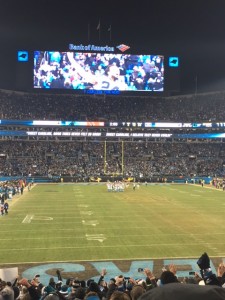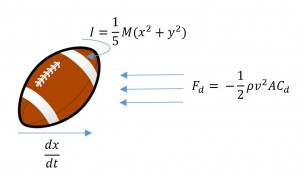
Over intercession break, I went back home to Charlotte – which is probably the happiest city in America right now. Our very own Carolina Panthers just punched their ticket to the Super Bowl, something the franchise hasn’t accomplished in over 10 years. The day after we clinched our Super Bowl berth, I was laying in bed watching football analysts apologize for estimating the Panthers, when a headline caught my eye. “Ravens’ John Urschel Accepted into PhD program at MIT”. It was one of those tiny headlines in the news ticker, and not a story they were actually covering. So I went on my computer and sure enough, there it was. Baltimore Ravens center John Urschel was just accepted into MIT’s PhD program in mathematics to study spectral graph theory, numerical linear algebra, and machine learning. Now, having talked to some of my own math professors about their research, I know how difficult it is to do novel research in such advanced topics, especially in the seemingly inaccessible world that is math. But to do all of that while enduring the physical and mental pressures of playing football for an NFL team? I couldn’t believe it.
I kept reading, and discovered more about Urschel’s fascinating story. After completing a master’s degree in math at Penn State (where he was a captain of both the football and track and field teams), Urschel was selected by the Ravens in the 2014 NFL Draft. During his rookie season, Urschel not only played 11 out of the 16 regular season games, but also co-authored a paper titled “A Cascadic Multigrid Algorithm for Computing the Fiedler Vector of Graph Laplacians” published in the Journal of Computational Math – a journal which I have had to read for some of my classes. During the season, Urschel would spend his time off the field reading math books and research papers. Imagine that. He’s a professional football player with the freedom to do whatever he wants in his time away from the sport. And John Urschel spends his time poring over math research.

Even though I’m a huge Panthers fan and am very excited for the Super Bowl, I was upset that the media wasn’t covering this story in light of the upcoming game. In my opinion, this is one of the most incredible achievements I’ve ever read about. It’s one thing to be an excellent mathematician as well as an accomplished physicist. Or be a 5-star recruit in both football and baseball. But to be an avid mathematician while playing football at the highest level? That’s amazing.
To me, it’s interesting that Urschel happens to be both an offensive lineman and a researcher. Both professions demand a great deal of patience and responsibility in order to be successful. But even if you do find success, it’s very unlikely that your success will be celebrated. Football fans tend to overlook the tremendous importance of having great offensive linemen, and it is relatively common knowledge that researchers aren’t properly compensated for their work. Yet, John Urschel does both and thoroughly enjoys it as well.
That really taught me a lot about research – especially doing research at a place like Princeton. Students at this school juggle so many different responsibilities – both social and academic – but we choose to take on this challenge. We choose to balance research with classes and clubs, like Urschel balances his research with his full-time job as a professional athlete. And while the research process is inherently frustrating and not always immediately successful, driven researchers are persistent just as Urschel is both on and off the field. As an offensive lineman, Urschel gets pushed flat on his back more than anyone on the field, but he gets right back up to prepare for the next play. And I imagine he does that with his research as well. If one approach or method isn’t working particularly well, he isn’t afraid to start over and go down a different avenue of thought.
That’s really what it takes to be a successful researcher: personal motivation and passion. If you’re really interested in learning about something, nothing can hold you back because you define your own metric for success. So while I think everyone can and should appreciate the level of perseverance it takes to do what Urschel does, he doesn’t look for outside validation. He’s just happy doing what he loves to do, and to me, that is inspirational in a wonderfully unique way. In fact, after recently upping my social media game, I might even say that Urschel is #goals.
— Kavi Jain, Engineering Correspondent

